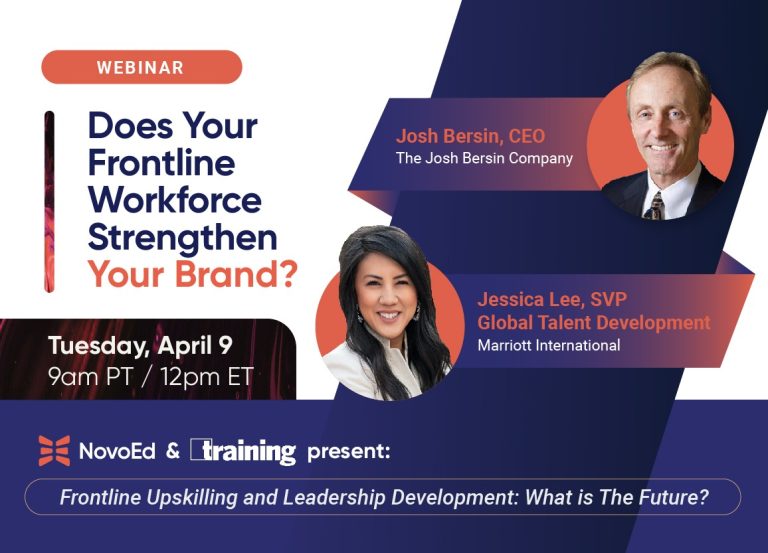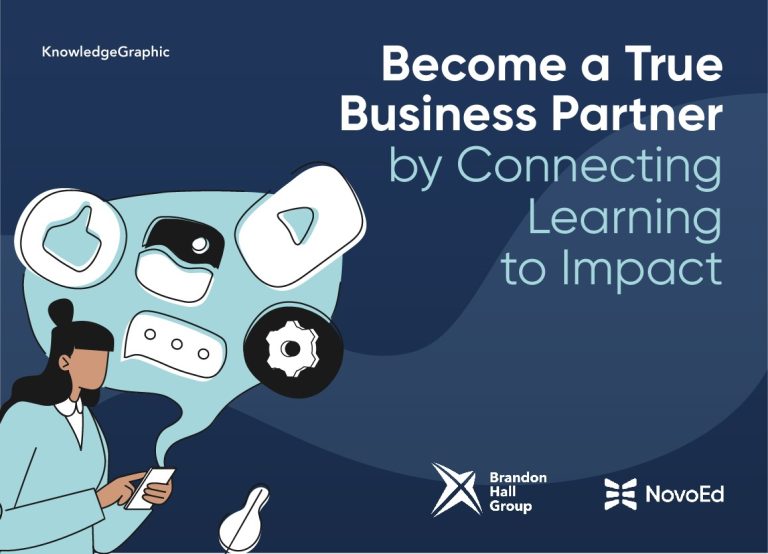Craig Weiss on the Impact and Possibilities of AI in L&D
Guest post by Teresa Stenson
When Generative AI had what you might call its ‘breakout year’ in 2023, it brought with it intense debate and questions for the future of the workplace, managing to evoke both fear and fascination in equal measure.
Concerns around job losses have proved to be valid, with many companies finding that GenAI can streamline many operations and processes. At the same time, there was — and still is — a sense of excitement about the possibilities of this advancing technology.
Here at NovoEd we’ve stayed curious about how AI can help our platform, and our customers, to be more efficient. Course translation is one area where we’re really utilizing AI to enhance our learners’ experience; it allows immediate translation not only of course content, but interactions. This is a huge value proposition.
And yet we also know there’s still much for us to learn here. Any technology that moves at such a rapid rate requires us to move alongside it, so we can not only keep up, but understand it and evolve with it.
And so we did two things. First, our own market research to get a picture of how corporate learning organizations are currently feeling about AI; and second, we invited analyst Craig Weiss of The Craig Weiss Group, renowned for his expertise in learning technology, e-learning and AI in the workplace, to take part in a webinar in April 2024: AI In L&D: Roles, Risks, and Opportunities.
A shifting conversation
To set the scene, NovoEd’s head of product marketing, Jacob Nikolau, shared some of the insights from our market research. When we surveyed 515 employees across various large enterprises — including L&D managers, leaders and decision makers — it was our aim to get a better understanding of how GenAI and AI-related disruption was affecting L&D decision making.
Interestingly, what we found is that the conversation around AI has shifted. While questions are still being asked, they’re different questions: more complex, more strategic.
Questions like: What are the core skills that we need to train? How can GenAI make our business more competitive? And in L&D, how do we embrace GenAI in program design and learning strategy without compromising quality?
An overarching trend that we saw is that leaders don’t feel their teams are prepared for the future, with 81% responding to say they lack the skills that they’re going to need by 2025.
Obviously, this is a concern, and it’s something we wanted to get Craig’s take on.
It’s time to get strategic
First, we heard from Craig how a study by Oliver Wyman found that 79% of employees are keen to learn about AI, mirroring our own findings that people have an appetite for embracing and understanding this technology.
So the big question for leaders is this:
How can corporate learning professionals equip their teams with the necessary skills to thrive in the age of GenAI?
According to Craig, a good place to start is to think not just about upskilling, but reskilling too. This means going beyond trying to be ‘better’ at our jobs, and looking at how we can adapt and apply the skills we already have in this new era. This allows us to not only keep up with the advancements in AI, but to use it to our benefit as much as we can.
For Craig, this means drawing on and developing the very human skills of analytical thinking and critical thinking, and — perhaps most importantly — being open to continuous learning.
When training workers around AI, Craig notes, “You need to have a learning platform, that’s the first thing. And you need the learning to be daily; it has to be continuous.”
That sense of continuous learning, along with an openness to change, form the basis of Craig’s advice on how those in L&D roles can best deal with the impact of AI.
“If you’re in an L&D role, you need to look at everything strategically. Say to yourself, what can AI do for me? And what are things that I’m going to have to implement in my company, in my workforce, that can offset these things?”
Staying current is a big part of this; Craig suggests subscribing to a news app like Apple News and paying attention to what’s being written and discussed on the topic of AI. “It’s about continuous involvement, and a willingness to adapt.”
AI agents: The next big thing?
Looking ahead, Craig told us that 2025 will see the rise of the AI agent. Though many of us already have personal assistants like Siri and Alexa, the role of the AI agent is evolving to do more and more end-to-end tasks.
In L&D it’s enlightening to look at this from the learner side, where an AI agent could take on the role of a personal tutor or mentor, perhaps by extracting information and providing summary pieces that the user can use to consolidate their learning.
“It can streamline so many things. People want a learning system to be fully autonomous. AI agents can get you pretty close to that.”
As exciting as these developments might be, Craig urges caution for any company considering moving in this direction. “Before investing, you want to see the AI in action in the system. Don’t rely on a vendor just saying they have a particular capability. You want to see it.”
Both from our own research and this stimulating conversation with Craig, it’s clear that L&D professionals need to lead the way in their organizations to ready their workforces for the further advancements of AI. As AI takes over repetitive jobs and tasks, people with knowledge and skills about AI will become more important to company leaders.
Watch the full webinar here to get a deeper look at the profound impact of AI on the workforce — and to learn how you can adapt your training strategies to prepare for the dynamic workforce world of 2025.
Lynn Christiansen Esquer also contributed to this article.


